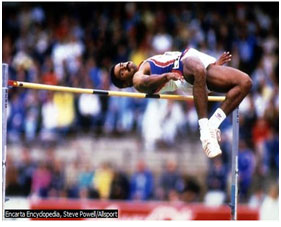Pole Vault is a field event which involves jumping over a horizontal placed obstacle (bar) that is supported by two uprights. The competition is performed by both male and female athletes, and the competitor is called a Pole vaulter.
(i) Flexibility
(ii) Agility
(iii) Speed
(iv) Courage
(5) Muscular Strength
(6) Concentration
(7) Determination

(i) The uprights: The components are made of iron metal.
Strength and height: The two uprights must be rigid and sufficiently high.
Spacing: Positioned at least 3.66m apart.
Movability: Movable up to 60cm forward and backward from the back of the box.
(ii) The crossbar: It is made of aluminium metal. It can be circular or triangular in shape.
The length should be between 4.48m—4.52m. It should have a minimum weight of 2.25kilos.
(iii) Supports of the crossbar: Must be uniform and of 13mm in diameter. Must extend 7.5mm
horizontally in the direction of the landing area.
The runaway: It shall be between 40m and 45m long. It shall have a width of 1.22m and 1.25m
(maximum). It shall be marked by white lines of 5cm wide.
The box: It shall be 1m long. It shall be 60cm wide. And should have an angle of 105 formed
between the base and the stop board.
This is the order of Pole Vaulting;
(i) The grip
(ii) run up
(iii) The plant
(iv) The take off
(v) The bar clearance and
(vi) The landing.
EVALUATION
(i) The grip
(ii) The run-up
(iii) The hand shift and plant
(iv) The take off
(v) The hang
(vi) The swing up
(vii) The turning
(viii) the clearance
(ix) the landing
(i) The Grip: For a right hand athlete, right hand placed at the top of the pole with the palm holding over and the thumb kept outside. The left hand holds the lower part of the pole with the fingers curling round it.
(ii) Carriage: (a) Pole must be kept at the right hand side. (b) At the hip joint level (c) The pole is not swayed while running.
(iii) Run up: (a) Feet should be parallel when starting off. (b) Take off foot is taken first and acceleration gradual. (c) Running action is similar to printing. (d) Length of the run up is about 11-15 strides.
(iv) Hand shift and the plant: (a) Lower hand is brought up, close to the upper hand and during the last three steps. (b) The pole is planted in the box, while the take off leg is slightly flexed at the take off.
(v) Take off: Take off is planted flat,should not be far from the box as the free leg is brought forward and backward.
(vi) The hang: The vaulter leaves the ground with the pole in front, then hangs on to the pole as the body is elongated.
(vii) The swing up: As the pole assumes vertical position, the vaulter flexes his legs and swing them up to clear the pole.
(viii) The pull-up: As the pelvis reaches the grip level, the arms are flexed to pull up the body.
(ix) The turn: As the body is pulled up, the body is also turned, so that he faces downward.
(x) The push up: The arms are extended to get the body to a hand- stand position on the pole immediately after the turn.
(xi) The clearance: As the leg start to descend, the pole is released and clears over the crossbar.
(xii) The landing: The legs are permitted to swing downward so that the back faces downward and allow the body to land in a semi-sitting position.
(i) Take off should be from one foot (single take off).
(ii) A vaulter should continue jumping until he/she has forfeited the right to continue further.
(iii) A failure is recorded if a vaulter, dislodges the bar, touch the ground or touch the landing area without clearing the bar.
(iv) A vaulter is out of competition when he dislodges the bar three consecutive times at a particular height.
(v) Measurement is made from the ground to the middle of the bar.
EVALUATION
(1) List out 5 skills allowed in pole vault.
(2) Mention 5 rules and regulations governing pole vault as a field event.
Read our disclaimer.
AD: Take Free online baptism course: Preachi.com 